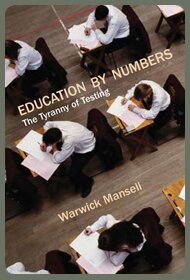Tuesday, July 19th, 2011
Well, I said at the end of the last blog that I’d be writing something imminently on the relationship between the Bew assessment review and the government’s ongoing national curriculum review. Here, slightly earlier than planned, is what I had in mind.
This week’s Government response to the Bew review into primary assessment could be redundant within just over two years.
That is the implication of comments made by a leading figure within the test regulator Ofqual at a conference on the national curriculum I attended on Friday.
Stephen Anwyll, Ofqual’s head of 3-14 assessment, said the long-term future of testing would be “up in the air” until after the outcome of the current national curriculum review was known.
Assessment arrangements in primary and secondary schools would have to be “completely revised” if the review led to a fundamental rethink of what schools teach.
The standards pupils achieved in any national assessments created as a result of the national curriculum review might also not be comparable with current performance, he said, since measurement would need to be “recalibrated” as assessments changed.
Mr Anwyll also suggested there was a contradiction between the Government’s suggestion, in its remit for the curriculum investigation, that it should not cover assessment and the detail of what it was being asked to look at. “You cannot separate the curriculum from assessment,” he said.
English, maths, science and physical education aspects of the curriculum for 5- to 16-year-olds are due to be revised for first teaching from September 2013 following the curriculum review, which is expected to produce first recommendations by early next year.
Speaking at a Keele University Centre for Successful Schools conference last Friday, Mr Anwyll talked about Ofqual’s detailed work to be carried out in response to the Bew review.
He then added: “Sitting beyond all of this, in the slightly longer term…all of this is up in the air depending on the outcome of the national curriculum review.
“If we are talking about, actually, a new programme of study, in the first instance for English, maths and science, which we are expecting to see some examples of this year, that could change the entire picture.
“If you reform standards as part of the national curriculum review, it’s ground zero again; you calibrate the standards from there- you cannot start comparing to previous standards.”
He added: “National curriculum assessments are excluded from the remit of the national curriculum review.
“But if you look at what’s included in the remit, it includes whether the national curriculum should be set out on a year-by-year basis, what should replace existing attainment targets and level descriptors to define better children’s standards of attainment, and what’s needed to provide expectations for progression to support the least able and stretch the most able.”
“All of these are absolutely fundamental to assessment, so you cannot separate curriculum from assessment.”
That comment appears to echo a statement by Sir Jim Rose, leader of England’s last curriculum inquiry, carried out in the dying days of the last Labour government. He was barred from considering assessment but said this was the “elephant in the room” when he visited primary schools.
Mr Anwyll added: “Much of what we do currently will have to be completely revised if we get a new national curriculum, new standards defined, and new ways of measuring them defined.”
That’s the newsy bit; the below is comment from me:
This notion of a contradiction between a national curriculum review which is supposed not to be looking at curriculum matters, and in practice it being impossible for a review of this type not to have serious implications for assessment was underlined this week in the Government’s response to the Bew report.
The remit for the national curriculum review says: “The review itself will not provide advice on how statutory testing and assessment arrangements should operate”.
Yet this week’s Government response to Bew says: “The national curriculum review will consider the suggestion from Lord Bew and the panel for statutory assessment to be divided into two parts….”*
It also says: “The National Curriculum Review will consider how we report statutory assessment in the long term.”
Hmm.
The full sentence of that quote above about statutory assessment being ‘divided into two parts’ is: “The National Curriculum Review will consider the suggestion from Lord Bew and the panel for statutory assessment to be divided into two parts in the future, with a ‘core’ of essential knowledge that pupils should have learnt by the end of Key Stage 2.”
This looks to be a suggestion that some “basic” skills literacy and numeracy tests be introduced at KS2. It is building on a somewhat mysterious idea flagged up near the end of the Bew report, which I blogged about here. One to watch, I think, and not only by people who wonder at the polarising language of “knowledge that pupils should have learnt”….
*I was reminded of this nugget of info via Helen Ward of the TES on twitter.
- Warwick Mansell
No Comments
posted on July 19th, 2011
